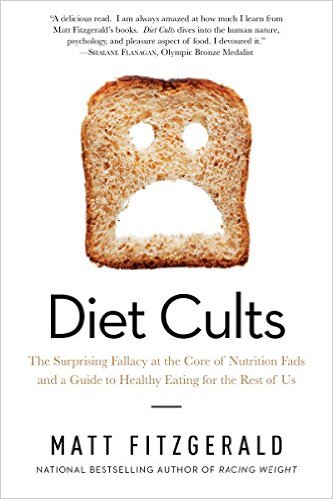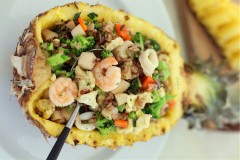关于作者Matt Fitzgerald更多资料见:
Matt Fitzgerald_运动营养学专家_Runner's World书籍作者-跑步作家-人物百科-跑步百科
//www.nduoke.com/renwubaike/matt-fitzgerald
Matt Fitzgerald出版的十多本畅销运动营养、跑步饮食书籍合集见:
Matt Fitzgerald(Runner's World运动营养学专家)书籍合集(附PDF电子书网盘下载地址)
//www.nduoke.com/running-books/matt-fitzgerald-books
《Diet Cults: The Surprising Fallacy at the Core of Nutrition Fads and a Guide to Healthy Eating for the Rest of Us》简介:
From the national bestselling author of Racing Weight, Matt Fitzgerald exposes the irrationality, half-truths, and downright impossibility of a “single right way” to eat, and reveals how to develop rational, healthy eating habits.
From “The Four Hour Body,” to “Atkins,” there are diet cults to match seemingly any mood and personality type. Everywhere we turn, someone is preaching the “One True Way” to eat for maximum health. Paleo Diet advocates tell us that all foods less than 12,000 years old are the enemy. Low-carb gurus demonize carbs, then there are the low-fat prophets. But they agree on one thing: there is only one true way to eat for maximum health. The first clue that that is a fallacy is the sheer variety of diets advocated. Indeed, while all of these competing views claim to be backed by “science,” a good look at actual nutritional science itself suggests that it is impossible to identify a single best way to eat. Fitzgerald advocates an agnostic, rational approach to eating habits, based on one’s own habits, lifestyle, and genetics/body type. Many professional athletes already practice this “Good Enough” diet, and now we can too and ditch the brainwashing of these diet cults for good.
About the Author
Matt Fitzgerald is an acclaimed endurance sports and nutrition writer and certified sports nutritionist. His most recent book, Iron War, was long-listed for the 2012 William Hill Sports Book of the Year, and he is the author of the best-selling Racing Weight. Fitzgerald is a columnist on Competitor.com and Active.com, and has contributed to Bicycling, Men’s Health, Triathlete, Men’s Journal, Outside, Runner’s World, Shape, Women’s Health and has ghostwritten for sports celebrities including Dean Karnazes and Kara Goucher.
《Diet Cults: The Surprising Fallacy at the Core of Nutrition Fads and a Guide to Healthy Eating for the Rest of Us》读者评论:
Food and diet is a very touchy subject these days. Also we live in a society that loves labels. We live in a time where it's kind of a badge of honor to have some condition that requires you to be on some special diet. No longer can you have people over for a meal without first asking what they are allergic or sensitive to or choose not to eat. Long ago it was so very rare to come across people with any sort of special needs diet. But not anymore.
Why is that? Well, there are no easy answers of course. I am not a person who's vegan, raw, gluten free, etc. etc. but I try to understand what's behind those who are. This book is interesting to me in that the author brings out how diets do go through "cult" status for a time. For example, he brought out how a few decades ago, yeast was the big culprit to poor health. That fizzled out. Nowadays it's like half the American population is gluten intolerant. He points out that while yes, there are people who are actually gluten intolerant, there are many people eating this way just because it's a fad and they really don't need to. Gluten is looked on as BAD. The author states it's not gluten itself that's the problem, but the "trigger" that causes the body to not be able to tolerate/digest it is the problem.
He mentioned how as recently as the 1960s the average American got 20 to 30 percent of his daily calories from bread; people were ingesting way more gluten back then than now. I found that interesting that bread was such a major part of the diet in the recent past. He said that some people think that genetic modification of wheat, and it's resulting higher gluten content is the cause of the rise of gluten intolerance. But he then asks why are all autoimmune diseases generally on the rise? (Not all autoimmune diseases are related to gluten).
The author gives his opinion that perhaps it is stress that is a major trigger to so many of the health issues plaguing our society today. I so liked this statement in the book:
"We are seeing more and more evidence that humans are not psychologically equipped to handle the world we're creating, and it's making us sick...The urbanization of the world is just one of the many ways in which modern life is increasingly testing our psychological limits and damaging our health. Others include the disappearance of community and the deepening of social isolation." (pg. 213)
I believe this to be right on- in my lifetime (I'm in my early 50s) I've seen an almost total 180 in social activities...back in the early 80s I could go drop in on my neighbors and the children would play together and we moms would talk. Life was so much calmer. People ate regular food and it was no big deal. Nowadays, one has to call in advance to set up an appointment to get together with friends. Everyone's busy, busy, busy. Stress is surrounding us in our own daily life as people are called to do more work because an employer can't afford enough workers. We suffer stress and anxiety as we hear the national and world news. I do believe stress is probably a HUGE trigger to what makes people intolerant of certain foods or substances in foods.
I also agree with the author's assessment that while we should food that is as pure and as close to nature as possible, that even if we do that, we may still have health issues. We live in a polluted world. The air we breathe when we step out the door if full of chemicals from exhaust fumes, chemical sprays on agriculture fields, sprays your neighbor puts on his grass and trees. Our water has contaminants. Our homes off gas formaldahyde and other toxins from the chemicals in the carpets, wall board, etc. We have to admit that it's much more than food alone that is making us sick, much more than food alone that triggers our bodies not to handle certain foods.
I don't know the author at all, and I'm no expert. But I feel the author gives a balanced presentation for people to consider. Let's not just rush from one diet craze to another. Sure, we must do our best to figure out what's causing us or our loved one to feel sick, but also do so using common sense and moderation. I remember my grandmother often saying moderation was the best policy. Be moderate in your eating and drinking. It's okay to have coffee, sugar, meat, cooked foods, potatoes, dairy, etc. in moderation. We children grew up healthy under my grandmother's moderate view of cooking- we were rarely sick.
I also agree with the author that there is no one "right" way to eat that fits everyone. Each person must work that out for himself. I also agree that a lot of diets/ways of eating are hyped because there's a lot of money to be made- thousands of easily gullible people wanting a quick fix and will buy anything at any cost to lose weight, look good, feel better. How many of the crazy supplements sold really help that much across the whole board of the American population? Also, I think it feeds something in human nature to boast that you are following some diet, some way of eating...that you somehow are above the average person to be in the know, to be cool about food and diet and health.
I liked this book and his balanced approach in presentation of fad diets and food issues. I'm not saying he's 100% right on; he doesn't claim to have all the answers. But he makes sense. Read the book and see how you feel about what he says. Take from it what will help you toward better health and leave the rest.
I looked forward to the publication of “Diet Cults” by Matt Fitzgerald after reading and enjoying his books “Racing Weight” and “The Racing Weight Cookbook”. I highly recommend "Racing Weight" and the companion cookbook as general, outcomes-based guides to what sorts of diets work for champion endurance athletes and how you might refine your own diet to help with your competitive endurance endeavors. In these books, Fitzgerald does not poo-poo any specific diet yet goes about substantiating the relevance of a healthy agnostic approach to diet for endurance athletes. The books contain sensible diet advice based on observations of what works for champions. Given that “Racing Weight” is now in a second edition, many others are similarly impressed with the contents of this work.
“Diet Cults” is an attempt by Fitzgerald to bring some rationality to the spectrum of religions that make up the current diet universe. “Food is Religion” is one of the many operative concepts that Fitzgerald discusses and analyzes with respect to the impact on the decison-making process of the privileged and fortunate in this world who have the freedom to decide what sort of diet they are going to consume. In fact the book starts out speaking to the origin of diets as coming from semi-religious and religious communities where such diets helped reinforce (and enforce) adherence to the religious tenets in place at the time. Religion as the origin of diets (and “diets as religion”) really helps one understand today’s current dogmatic, polarized situation. As Fitzgerald points out, “rationality” does not have a large place at this point and looking rather to outcome-based results is a defensible way to approach your own diet.
Fitzgerald does a reasonable job at describing the various popular diets (food religions) today and uses stories and “characters” (e.g. Brian MacKenzie of CrossFit) to help entertain the reader in the process- some with greater success than others. This “Gladwell-esque” style can be very engaging on such semi-non-fiction subjects but Fitzgerald needs to more fully develop the many sides of the “stories” rather than just concentrate on the “character”. He misses out on the powerful combination of presenting both the “focus character” and the “character(s)” behind the studies and science that may or may not support the particular diet (much as Gladwell does in some of his books and essays). There is a near total miss on the later and substantially detracts from what would, with such additions, be a landmark book. It would be a longer book, but a much better book.
His calling-out of Tim Noakes on the subject is well done and demonstrates that “religion” can infect even the best of scientists. Other examples of such "scientific" over-zealousness are also included in the book. This serves as a fair warning to all about the powerful polarization and irrationality that has always infused the subject.
Whilst I personally subscribe to Fitzgerald’s “Healthy Agnostic Eating” concept, he could make a much stronger case with the inclusion of some level of a comprehensive review of what the (currently defective) field of “nutrition science” is finding- in particular that there is very little that can be concluded from a rigorous scientific perspective based on what we know today.
The book is a quick read and quite enjoyable in stretches but lacks quite a bit of depth and has no index. It is more like a very long essay than it is like a book and would serve as a starting point for anyone who would like to make a study of diets, their origins, and their efficacy. Fitzgerald does however have an important message about diet- there is no one way. The extent to which he conveys this to the typical reader will determine the success of this book.
I recommend the book but be aware that it is an “hors d'oeuvre” on the subject. Hopefully the main course will come soon.
更多减肥书籍:
减肥书籍(运动减肥|饮食减肥|科学减肥)大全://www.nduoke.com/jianfeishuji
减肥书籍_运动|饮食|科学减肥方式精选及下载://www.nduoke.com/jianfeishuji/jianfei
饮食书籍(健康饮食|运动营养|饮食减肥)精选及下载://www.nduoke.com/yinshishuji/yinshi
更多运动书籍下载见://www.nduoke.com/yundongshuji
一些必不可少的涉及到减肥方面的知识见:
营养与减肥//www.nduoke.com/nutrition-and-weight-loss
跑步减肥瘦身//www.nduoke.com/weight-loss
跑步营养食谱//www.nduoke.com/running-recipes
科学减肥://www.nduoke.com/tag/科学减肥
饮食减肥://www.nduoke.com/tag/饮食减肥
运动减肥://www.nduoke.com/tag/运动减肥




